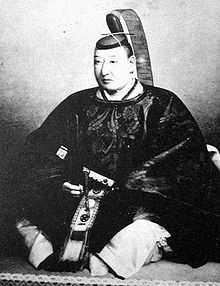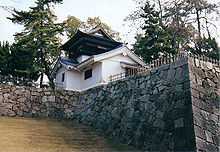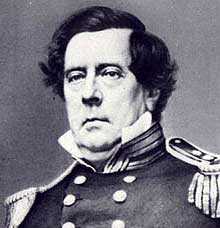Abe Masahiro
| Abe Masahiro | |
|---|---|
 | |
| Abe Masahiro | |
| Lord of Fukuyama | |
| In office January 31, 1837 – August 6, 1857 | |
| Preceded by | Abe Masayasu |
| Succeeded by | Abe Masanori |
| Personal details | |
| Born | December 3, 1819[1] Edo, Japan |
| Died | August 6, 1857 (aged 37)[1] Edo, Japan |
| Nationality | Japanese |
| Spouse(s) | Matsudaira Noriko (1st), a daughter of Matsudaira Yoshinaga (2nd) |
Abe Masahiro (阿部 正弘, December 3, 1819, Edo (now Tokyo) – August 6, 1857, Edo)[1] was the chief senior councillor (rōjū) in the Japanese government at the time of the arrival of Commodore Matthew Perry. Against the shogun's wishes, and the wishes of many other government officials, he worked to open Japan to the West, signing the Convention of Kanagawa in 1854, and other unequal treaties shortly afterwards.[2]
Biography
Early life
Abe Masahiro was born in his family's residence outside Edo Castle. He was the 6th son of Abe Masakiyo, the 5th lord of Fukuyama. Upon his father's death in 1826, his elder brother Masayasu became lord of Fukuyama; Abe was moved to the domain's naka-yashiki (middle residence) in Hongō, Edo (modern-day Bunkyō, Tokyo). However, in 1836, Masayasu adopted his brother as heir. Abe succeeded to family headship upon his brother's retirement in early 1837, and became lord of Fukuyama, taking the opportunity to make the long journey there.[3]

Career in the Tokugawa Shogunate
Abe was appointed a Soshaban (master of ceremony) in 1838; in 1840 Abe received the post of jisha bugyō (minister of shrines and temples). He became rōjū three years later, in 1843, moving his residence to the Abe family's estate at Tatsunokuchi, outside Edo Castle. He became rōjū shuza (老中首座, presiding senior councillor) in the same year, after Mizuno Tadakuni lost his standing over the failure of the Tenpo reforms. Throughout the course the reigns of the 12th and 13th shoguns Ieyoshi and Iesada, Abe worked to unify shogunate politics, as well as to strengthen their defenses to assist in maintaining their isolationism.[1] He supervised the reconstruction of the western enceinte of Edo Castle in 1852, and was awarded an increase of 10,000 koku in income for this service. In the meantime, he kept the shogunate abreast of foreign political developments, such as the outbreak of the First Opium War.

Commodore Perry's famous episode of gunboat diplomacy occurred in early 1854; Abe was one of the top officials of the shogunate to meet with Perry, and his officers, to negotiate arrangements between their two countries. On March 31, Abe signed the Convention of Kanagawa,[1] marking the beginnings of the opening of Japan and extending the arm of friendship to the United States. The treaty allowed for American use of certain Japanese sites as coaling stations, the opening of several ports, and the establishment of a consulate. Abe would then sign similar treaties with Russia, the Netherlands, and Great Britain very soon afterwards.[1]
All of this raised significant opposition both within the shogunal government, and without, among political factions defined by the slogan sonnō jōi (尊皇攘夷, "Revere the Emperor, Expel the Barbarians"). Thus, he resigned in October 1855 and was replaced by Hotta Masayoshi, who sought to undo much of Abe's work, and to close Japan once more.[4]
Later Life and Death
Despite his resignation, Abe continued to have significant influence for the rest of his life. He aided in the formation of a modern military, advocated the study of Western sciences, and supported the notion of government selection of talented men, even of low birth, to serve as workers or bureaucrats.
Abe died in 1857, and was succeeded by his nephew, Abe Masanori.
Notes
- ↑ 1.0 1.1 1.2 1.3 1.4 1.5 Hoiberg, Dale H., ed. (2010). "Abe Masahiro". Encyclopedia Britannica. I: A-ak Bayes (15th ed.). Chicago, IL: Encyclopedia Britannica Inc. p. 24. ISBN 978-1-59339-837-8.
- ↑ Harold Bolitho, Treasures among Men, p. 99.
- ↑ This would be the only time that Abe set foot in his domain.
- ↑ Bolitho. p. 233.
References
- Bolitho, Harold. 1974). Treasures Among Men: The Fudai Daimyo in Tokugawa Japan. New Haven: Yale University Press. 10-ISBN 0-300-01655-7/13-ISBN 978-0-300-01655-0; OCLC 185685588
- Nussbaum, Louis Frédéric and Käthe Roth. (2005). Japan Encyclopedia. Cambridge: Harvard University Press. 10-ISBN 0-674-01753-6; 13-ISBN 978-0-674-01753-5; OCLC 48943301
- Mass, Jeffrey P. and William B. Hauser, eds. (1985). The Bakufu in Japanese History, (Harold Bolitho, "Abe Masahiro and the New Japan"). Stanford: Stanford University Press.
Further reading
- Doi Ryōzō 土居良三 (2000). Kaikoku e no fuseki: hyōden, rōjū shuza Abe Masahiro 開国への布石: 評伝・老中首座阿部正弘. Tokyo: Miraisha 未來社.
- Feifer, George (2006). Breaking open Japan: Commodore Perry, Lord Abe, and American imperialism in 1853. New York: Smithsonian Books/Collins.
- Watanabe Shūjirō 渡辺修二郎 (1978). Abe Masahiro jiseki 阿部正弘事蹟. Tokyo: Tokyo Daigaku Shuppankai 東京大學出版會.
- Totman, Conrad. “From Sakoku to Kaikoku, The Transformation of Foreign-Policy Attitudes, 1853-1868.” Monunmenta Nipponica. Vol. 35 No. 1, p. 1-19.
- Totman, Conrad (1980). The Collapse of the Tokugawa Bakufu 1862-1868. Honolulu: University of Hawai'i Press.
| Preceded by Abe Masayasu |
7th (Abe) Lord of Fukuyama 1837-1857 |
Succeeded by Abe Masanori |